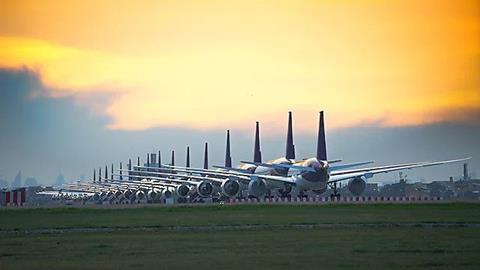Aviation is vital for social and economic progress but if the world is to continue to benefit from flight, the sector must decarbonise.
Aviation is vital for social and economic progress but if the world is to continue to benefit from flight, the sector must decarbonise.
The scale of the challenge is significant – pre-COVID-19, aviation produced around 1 billion tonnes of carbon emissions in 2019: around 3% of the world’s annual total.1 And yet, aviation can and has to do more when it comes to decarbonisation.

The sector must reduce its emissions faster and reach net zero sooner. Our recent report with Deloitte, Decarbonising Aviation: Cleared for take-off, reflects the views of over 100 experts and leaders from across the aviation sector and over 6,000 business and leisure travellers.2
One of the key findings was that current global industry targets are not ambitious enough, and the aviation sector should aim to achieve net-zero emissions by 2050. Shell supports this view, and so it was encouraging to see IATA also back this target at its AGM in October.3
If the industry is to meet this target, each party across the whole value chain needs to understand the challenges we face, then identify and agree on the solutions to overcome them.
One player cannot decarbonise the whole sector; only with everyone pulling together in the same direction can we achieve the necessary change.
A shared priority
Looking forward, all trend analysis foresees flying increasing over the next decades to come. IATA’s 20-year growth forecast estimates global air passenger growth could be in the range of 1.5% and 3.8%.4 In fact, aviation could represent up to 22% of global emissions by 2050 if demand increases as expected and other sectors decarbonise more quickly.5 Therefore we must not only decarbonise at our current rate of travel but also find solutions that mitigate emissions for an increased service.
Encouragingly, our research identified that there is broad alignment on this view across the sector. 90% of aviation industry leaders consider decarbonisation to be a top three priority for their business.
But our findings also identified significant barriers too. Global targets were cited by respondents as being neither sufficiently ambitious nor adequately supported by local regulation.
Financial barriers were also highlighted, including in relation to the high cost of sustainable aviation fuel as well as the reluctancy of leisure passengers to absorb the cost of lower emissions solutions.
And when it comes to compensating for the remaining emissions that cannot be avoided, many within the aviation industry remain sceptical about the role of carbon offsets in decarbonising the sector.
Strategies to decarbonise
But although significant, these barriers are not insurmountable - the research found clear strategies for overcoming them. With collaboration, innovation and ambition across the full aviation ecosystem, these strategies can accelerate change.
Governments have a key role to play. The decarbonisation of aviation will require a comprehensive regulatory regime, one that encourages consistent customer demand and provides fiscal support to drive infrastructure development, new technologies and SAF production plants.
And there is much that the industry can do. Energy providers can increase the production and supply of SAF, financial institutions can provide more funding for SAF production, and in the future, through schemes currently being developed and set to come online imminently, corporate flyers can purchase more SAF as part of their environmental, social and governance commitments.
Perhaps most critically in the immediate term – offsets must be made more transparent and verifiable. They need to be more emotionally appealing to passengers, and their impact should be clearer.
These are just some of the steps that will need to be taken. But the increasing alignment across the sector on both the urgency and the actions required to accelerate progress on decarbonising aviation provide reasons for optimism.
An ecosystem approach
Shell believes the aviation industry can and needs to achieve net-zero emissions by 2050. The challenge is enormous, but the decarbonisation tools exist.
What’s needed now is for all parties across the aviation sector to act together and act fast, making use of all available options to stay in step with society’s expectations to decarbonise.
We intend to be a catalyst for positive change - working together with all players in the aviation ecosystem to help accelerate the sector’s pathway to net-zero.
To read more from Jan, follow him on LinkedIn here.
[1] https://www.shell.com/energy-and-innovation/the-energy-future/decarbonising-aviation.html
[2] https://www.shell.com/energy-and-innovation/the-energy-future/decarbonising-aviation.html
[3] https://www.iata.org/en/pressroom/2021-releases/2021-10-04-03/
[4] IATA, 2019 – 2040: Current trends, https://www.iata.org/contentassets/fe5b20e8aae147c290fc4880f120c969/2021.11_passenger-forecast-infographic-update_v1-01.png
[5] Shell and Deloitte ‘Decarbonising Aviation: Cleared for take-off’























